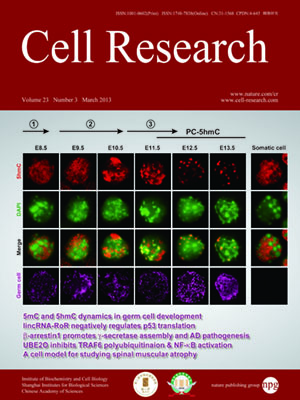
Volume 23, No 3, Mar 2013
ISSN: 1001-0602
EISSN: 1748-7838 2018
impact factor 17.848*
(Clarivate Analytics, 2019)
Volume 23 Issue 3, March 2013: 394-408
ORIGINAL ARTICLES
A novel role of hematopoietic CCL5 in promoting triple-negative mammary tumor progression by regulating generation of myeloid-derived suppressor cells
Yan Zhang1, Dandan Lv2, Ha-Jeong Kim1, Robert A Kurt3, Wen Bu4, Yi Li4 and Xiaojing Ma1,2,5,6
1Department of Microbiology and Immunology, Weill Cornell Medical College, 1300 York Avenue, New York, NY 10065, USA
2School of Life Science and Biotechnology, Shanghai Jiao Tong University, Shanghai 200240, China
3Department of Biology, Lafayette College, Easton, PA 18042, USA
4Lester and Sue Smith Breast Center & Department of Molecular and Cell Biology, Baylor College of Medicine, One Baylor Plaza, Houston, TX 77030, USA
5Department of Pediatrics, Weill Cornell Medical College, 1300 York Avenue, New York, NY 10065, USA
6Graduate Program in Immunology and Microbial Pathogenesis, Weill Graduate School of Medical Sciences, Cornell University, 1300 York Avenue, New York, NY 10065, USA
Correspondence: Xiaojing Ma(xim2002@sjtu.edu.cn; xim2002@med.cornell.edu)
CCL5 is a member of the CC chemokine family expressed in a wide array of immune and non-immune cells in response to stress signals. CCL5 expression correlates with advanced human breast cancer. However, its functional significance and mode of action have not been established. Here, we show that CCL5-deficient mice are resistant to highly aggressive, triple-negative mammary tumor growth. Hematopoietic CCL5 is dominant in this phenotype. The absence of hematopoietic CCL5 causes aberrant generation of CD11b+/Gr-1+, myeloid-derived suppressor cells (MDSCs) in the bone marrow in response to tumor growth by accumulating Ly6Chi and Ly6G+ MDSCs with impaired capacity to suppress cytotoxicity of CD8+ T cells. These properties of CCL5 are observed in both orthotopic and spontaneous mammary tumors. Antibody-mediated systemic blockade of CCL5 inhibits tumor progression and enhances the efficacy of therapeutic vaccination against non-immunogenic tumors. CCL5 also helps maintain the immunosuppressive capacity of human MDSCs. Our study uncovers a novel, chemokine-independent activity of the hematopoietically derived CCL5 that promotes mammary tumor progression via generating MDSCs in the bone marrow in cooperation with tumor-derived colony-stimulating factors. The study sheds considerable light on the interplay between the hematopoietic compartment and tumor niche. Because of the apparent dispensable nature of this molecule in normal physiology, CCL5 may represent an excellent therapeutic target in immunotherapy for breast cancer as well as a broad range of solid tumors that have significant amounts of MDSC infiltration.
Cell Research (2013) 23:394–408; doi:10.1038/cr.2012.178; published online 25 December 2012
FULL TEXT | PDF
Browse 2165


